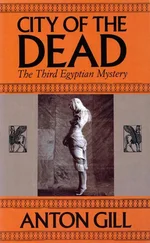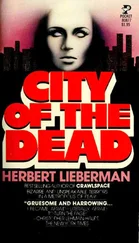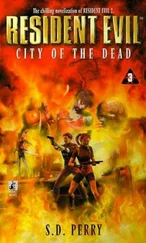Robert Sheckley - City of the Dead
Здесь есть возможность читать онлайн «Robert Sheckley - City of the Dead» весь текст электронной книги совершенно бесплатно (целиком полную версию без сокращений). В некоторых случаях можно слушать аудио, скачать через торрент в формате fb2 и присутствует краткое содержание. Жанр: Фэнтези, на английском языке. Описание произведения, (предисловие) а так же отзывы посетителей доступны на портале библиотеки ЛибКат.
- Название:City of the Dead
- Автор:
- Жанр:
- Год:неизвестен
- ISBN:нет данных
- Рейтинг книги:3 / 5. Голосов: 1
-
Избранное:Добавить в избранное
- Отзывы:
-
Ваша оценка:
- 60
- 1
- 2
- 3
- 4
- 5
City of the Dead: краткое содержание, описание и аннотация
Предлагаем к чтению аннотацию, описание, краткое содержание или предисловие (зависит от того, что написал сам автор книги «City of the Dead»). Если вы не нашли необходимую информацию о книге — напишите в комментариях, мы постараемся отыскать её.
City of the Dead — читать онлайн бесплатно полную книгу (весь текст) целиком
Ниже представлен текст книги, разбитый по страницам. Система сохранения места последней прочитанной страницы, позволяет с удобством читать онлайн бесплатно книгу «City of the Dead», без необходимости каждый раз заново искать на чём Вы остановились. Поставьте закладку, и сможете в любой момент перейти на страницу, на которой закончили чтение.
Интервал:
Закладка:
The lighting of the city of the dead is like moonlight. Or like late afternoon sunlight in winter as seen from behind a bank of clouds. It is not night, it is not day. Twilight is the eternal hour in the city of the dead.
There's not a lot to do around here. But if you're bored, you can watch the people step out their windows and take to the catwalks to cross from one part of the city to another. There are wires that connect everything to everything else here, and some people use them as shortcuts, Tiptoing along the highwires to get from place to place. They do this clumsily, because few of the dead, just as few of the living, have any acrobatic ability. They use the catwalks and highwires anyway, no one fears falling. When you fall from a catwalk in the city of the dead, you tumble down to the ground slowly, slowly, like a shadow falling. If you happen to bounce off a cornice or two, or graze yourself on a gargoyle, or catch yourself on a sharp projecting bit of roof, it is no matter. You can't hurt yourself, you're already dead. You can't feel any pain. Pain is forbidden. That is because pleasure is forbidden. Or unlikely, almost the same thing.
Where there is no pleasure, there's no pain. Some might think that a good tradeoff. The dead in the palace of the dead don't think so. Being unable to hurt yourself just makes the boredom that much more excruciating. There are people in hell who cut their throats every evening. It doesn't do anything. It's just a gesture. But gestures are important when you don't have anything else, and all you have in hell are gestures. Some make gestures of pain, and cut their own throats. Others step out the windows and take to the catwalks and high wires and go visiting. Is visiting a pleasure? Not in hell. It is a gesture. The people of hell don't despise gestures. After you're dead, gesture is all that's left.
We zoom through a doorway, segue down a corridor, slither through a doorway, do the whole thing several times, and then we come to a stop in a large room. Achilles is sitting in a lyre-backed chair. We know it is him because affixed to his back there is a bronze plaque reading ACHILLES.
The matter of easy identification has been found necessary in hell, where unnecessary confusion is frowned upon. It is more than enough work just to be dead, without wondering who the people all around you are. This plaque system is for the benefit, not just of the inhabitants, but for future audiences which will look at the stories of people in this place on films made by us, the people who will either go back in time to record them, or build them up as imaginative constructs in the computer that can build anything that can be imagined. And looking just beyond that, we foresee a time when secondary and tertiary images will be capable of generation based not only on primary sources but also people's different versions of those primary sources; and while this might not strictly be the only kind of imagination-the jury's out on that one-it certainly is one of the possible sorts, a sort of synthesis manquй so the least we can do is keep everyone easily identifiable.
Back in the real world, of course, people are rarely found just sitting in a chair, not reading, not watching TV, not even thinking. But these are not realistic stories in that the sort of detail one would like-the incomes of the protagonists, their main loves and hates, their family tree for three generations, is unfortunately missing. But Achilles does in fact happen to be just sitting as we turn our attention to him. He spends a lot of time doing this. The problem of doing nothing is one of the greatest problems in hell, one which people have put a lot of attention into but not solved yet. Achilles certainly has not solved it. He is just sitting in his chair, staring into the middle distance.
Helen of Troy enters from the right.
It's a mistake to try to describe or even photograph the features of someone as famous, as numinous, as Helen of Troy, because her features exist mostly in dreams, where they are made up of the images generated by all the men who have ever dreamed of her, or at least a significant cross-section thereof, because the computer only needs a cross-section of data, not all of it. Since we don't use the dreams of everyone who ever dreamed of Helen, her reproduced image is a little blurred around the nose, though I think we captured her general shape quite nicely. Suffice it to say she's a good-looking dame of everyone's predilection, and she wears her bronze plaque with distinction, so you think, looking at her, she walks like she's Helen of Troy, and that of course is who she is. She wears a simple frock made of up silken ambiguities, and around her head is a golden lie.
"Hello, Achilles, " she says. "I'm just back from the marketplace. Boy, have I got a story to tell you."
Achilles had been staring off into the middle distance, paying no attention to his wife, Helen of Troy. But on hearing her words, he turned his head.
"How could you hear anything? There's never any news around here. What could ever happen in hell? Just people's opinions, that's all you get in hell. So what could you have heard in the marketplace? I suppose the philosophers have figured out another proof for the possibility or the impossibility of this place existing? Frankly, I couldn't care less. It's a matter of minor importance, whether this place exists or not. But even if they have a proof about it one way or the other, it is still hardly news."
"Do stop making speeches," Helen said "It isn't your turn. Despite your hypothesizing, I do happen to have real and incontestable news of a timely and late-breaking nature. That gives me the right, not only to speak, but also to embroider images and use words in strange and unlikely ways. For it is well known that matters must never be spoken of directly, and that one must not take refuge in the subterfuge which the Heisenbergian position forces on us."
"If you got some news," Achilles said brutally, "what is it?"
"That approach is much too simple, my darling," Helen said. "Once the bearer of news has discharged her novelty, it is all over, she has no more news to impart, she is forced to return to her original rather static position, Unappreciated Love Object. Me. Can you fancy that? No, don't be too quick, my friend, I need to get some value out of the fact that I might even carry news, without being forced prematurely to divulge it."
"You run a fine line," Achilles said, "since what you mean is that you carry the imputation that you carry news, rather than the news itself. And an imputation is of much less value than the fact it imputes toward."
"What I have heard is weighty enough," Helen said, "for me to interrupt you and to tell you that what I have to tell is even now taking place, but out of your sight, my dear Achilles. Now, wouldn't you like to know what is happening?"
The scene froze. The camera or whatever it was dissolved into a light show. This was pleasurable in its own right, and mildly hypnotic as well. The dead have found that everything goes better when you're mildly hypnotized. In fact, there are some who say that death itself is but a state of mild hypnosis, or, to be more specific, that there is no such thing as death, since what we call death is merely a pathological hypnotic state from which we cannot waken.
Be that as it may, the camera was powered through a cable that trailed out through the window, from which it hung in a great catenary loop so that, considering it as a roadway, we could travel along the curve, and see, at the top, a little house, under which the stream that is the cable flows. In the several rooms of this house above the torrent, there are various activities going on. We make a choice, go through the nearest door, and we see that we are in some sort of a control room. There's a man sitting there. Hello, it's me! I look closer to see what I am doing.
Читать дальшеИнтервал:
Закладка:
Похожие книги на «City of the Dead»
Представляем Вашему вниманию похожие книги на «City of the Dead» списком для выбора. Мы отобрали схожую по названию и смыслу литературу в надежде предоставить читателям больше вариантов отыскать новые, интересные, ещё непрочитанные произведения.
Обсуждение, отзывы о книге «City of the Dead» и просто собственные мнения читателей. Оставьте ваши комментарии, напишите, что Вы думаете о произведении, его смысле или главных героях. Укажите что конкретно понравилось, а что нет, и почему Вы так считаете.





